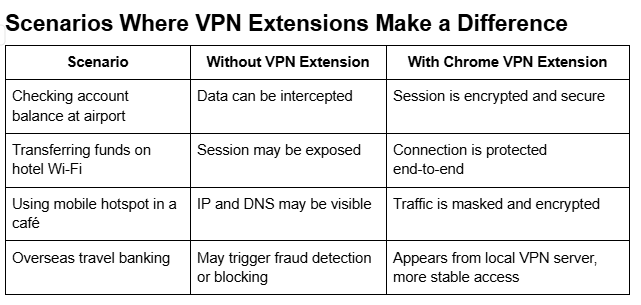

Unfamiliar or public Wi-Fi networks are convenient—but inherently insecure. Even if they require a password, they often lack strong encryption or isolation between connected devices. That leaves a window open for:
If you're entering banking credentials or viewing sensitive financial information, even a brief exposure could lead to real-world consequences.
When you access your bank on an open or unfamiliar network without a VPN:
While banks implement strong security on their end, your local connection is still a potential point of failure—and that’s where browser-based protection comes in.
A Chrome VPN extension provides browser-level encryption, creating a secure tunnel between your device and a remote server before your data reaches the internet.
This means:
And because it only affects browser traffic, a Chrome VPN extension is ideal for quick banking tasks without slowing down your entire device.

Using a VPN extension is only one layer of protection. Combine it with smart browser habits to minimize risk.
Don't log in until your VPN extension is active and connected.
Ensure you're on the bank's official site (with HTTPS and no typos in the URL).
This reduces the chance of credential autofill, history saving, or cookie storage.
Adds a second layer of security in case your login is ever compromised.
If you’re not on your own laptop or phone, avoid logging into your bank entirely.

Banking online while traveling or working remotely is common—but risky without precautions. Fortunately, you don’t need enterprise-level security tools to stay p
A reliable Chrome VPN extension creates a secure, encrypted tunnel for all your browser-based banking tasks, protecting your data even on the most questionable Wi-Fi.
Looking for a Chrome VPN extension that’s fast, lightweight, and offers airtight encryption for banking and sensitive tasks?
QuixVPN Chrome Extension is built for browser-only security, with no-logs infrastructure, leak protection, and instant setup—perfect for professionals and travelers alike.
Browse through these FAQs to find answers to commonly asked questions.
Popular articles